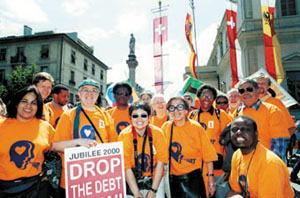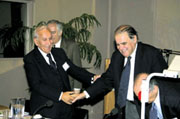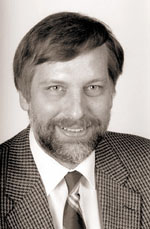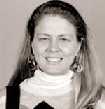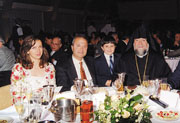August 2000
- Geneva 2000 elicits disappointment ... and hope
- Latin America: IADB meets with protestant church leaders
- New stage in WCC-Pentecostal dialogue
- US young adults to work for "the peace of Jerusalem"
- People
Marlin VanElderen
Janice Love and Kathryn Bannister
Jose Ramos Horta
Vatche Manoukian
Juan Michel
- Peace to the City music and dance
- Rapid and decisive action by the UN in Sierra Leone
- Orthodox reaffirm ecumenical commitment
- Following renewed outbreaks of "fratricidal ethnic conflict" in Sri Lanka
- The withdrawal of Israeli troops from Lebanon
- Rev. Dr Konrad Raiser's visit to Haiti
- Escalating conflict in the Malukus
- The role of Christian organizaations in the fight against AIDS
- Ecumencial connections
- Recent WCC publications
"Geneva 2000" - the NGO forum around the June UN General Assemblyís Special Session on Social Development - left a bittersweet taste in many mouths. An ecumenical team at the forum was disappointed with the results. But they were pleased that churches made a significant impact and cooperated closely with other NGOs: this augurs well for civil society's future ability to sustain and develop efforts to obtain justice for the poor and excluded.
The ecumenical team organized by the WCC and the Lutheran World Federation kept a high profile before and during "Geneva 2000". Members came from worldwide WCC networks, member churches, religious groups and related organizations, with priority going to representatives from the South, women and Indigenous Peoples. To make the churchesí point of view on social development known, they lobbied government delegates to the forum and organized public round-tables, worship services and street demonstrations.
In reply, Annan defended the report on grounds that it contains the UNís "targets and objectives" for social development, for which the international financial organizations "now express their support as well". He acknowledged, however, that the controversial document is hardly more than a "compendium of desirable targets and objectives", and regretted that it "did not make a stronger and more explicit case" for the measures neeeded to achieve these - for example, debt relief, access to industrialized-country markets for the least-developed countries, and an increase in official development assistance.
The future holds new challenges and opportunities for churches and NGOs engaged in the struggle for development with a human focus. The part they played in "Geneva 2000" suggests they are well equipped to tackle them. As Joy Kennedy, a team member from the Anglican Church of Canada, said: "We are getting clearer about whatís needed. We are coming together."
Following the Geneva 2000 meeting, the WCC held discussions with the International Monetary Fund (IMF) and the UN Conference on Trade and Development (UNCTAD), at the request of these two organizations.
More information: Geneva 2000
Members of the ecumenical team and other NGO representatives were particularly angry about a report entitled "A Better World for All", issued jointly by UN secretary-general Kofi Annan with senior officials of the OECD, the World Bank and the IMF. For WCC general secretary, Rev. Dr Konrad Raiser, presenting the report at the opening of "Geneva 2000" was "a propaganda exercise" for the very institutions whose policies help prevent social development. By undermining its independence and authority, the report did "considerable damage to the credibility of the UN", Raiser said.
Representatives of churches and other WCC-related organizations in the ecumenical team worked hard before and during "Geneva 2000" to get their views heard there. Hence their disappointment when their demands - eradication of poverty, debt cancellation and limiting large-scale movements of speculative capital - were not reflected in the Special Session's results. Still, according to team member Bernardino Mandlate, Methodist bishop of Maputo (Mozambique), intense discussion showed that "some of our concerns are finding fertile ground".
